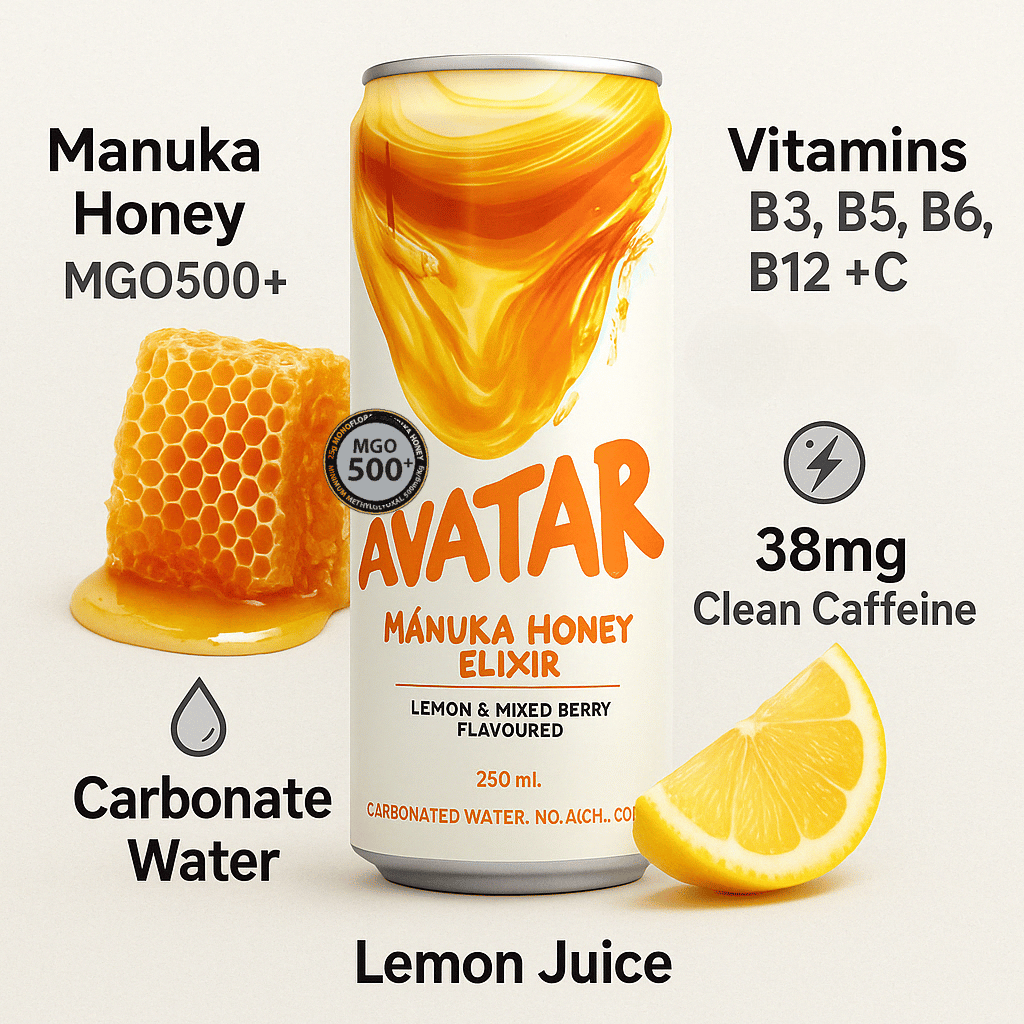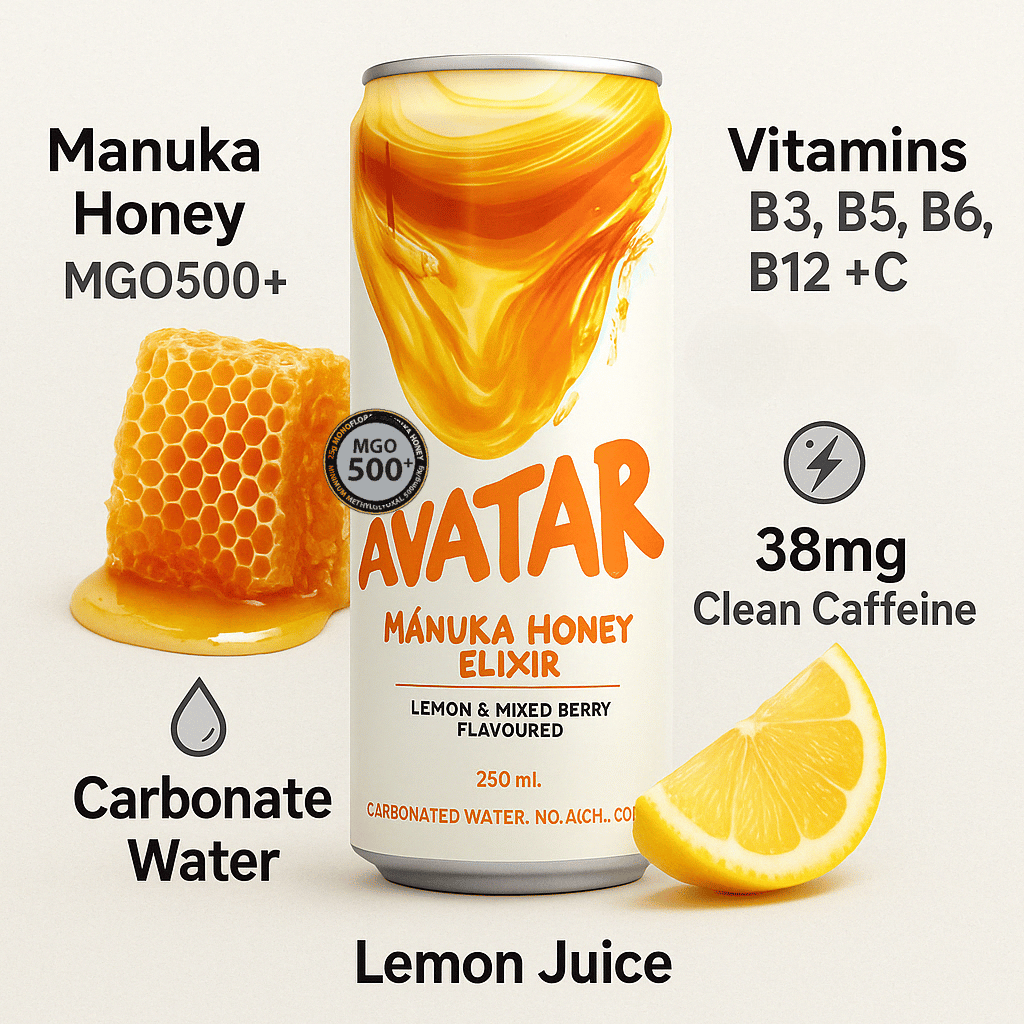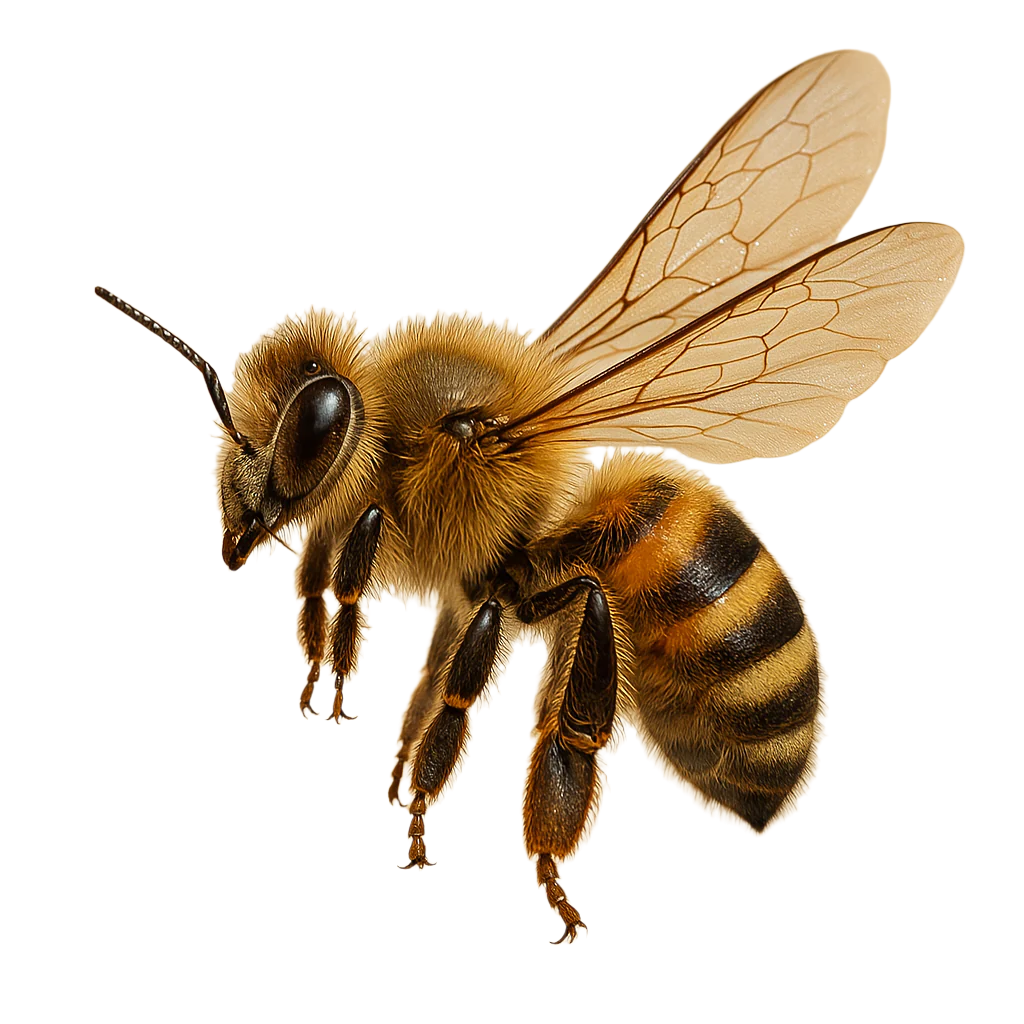🍯 Why Is Honey So Good?
It’s been called “liquid gold” for thousands of years, but why exactly is honey so revered across cultures, medicine, and modern wellness? In this comprehensive guide, we explore why honey continues to be one of nature’s most powerful, versatile gifts.
1. Honey Is a Natural Energy Source
At its core, honey is a pure carbohydrate around 80% sugar by weight providing immediate, fast-absorbing energy. It contains a natural balance of fructose and glucose, which are metabolised differently by the body, giving it both a quick and sustained release of energy.
One tablespoon of honey contains about 64 calories and ~17 g of sugar, but unlike refined sugar, it also comes with trace enzymes, minerals, and antioxidants.
2. It’s More Than Just Sugar: A Closer Look at Nutrients
Although not a significant source of vitamins or minerals by volume, honey contains over 30 trace nutrients derived from nectar and bee enzymes. These include:
- 🌿 B Vitamins (B2, B3, B5, B6)
- 🌿 Vitamin C (in small amounts)
- 🌿 Minerals like calcium, magnesium, potassium, zinc, and iron
While these are present in small quantities, they offer more nutritional value than table sugar, which is 100% empty calories.
3. Antioxidants and Anti-Inflammatory Power
Honey is rich in polyphenols and flavonoids compounds with antioxidant properties. These can help neutralise free radicals, support cellular repair, and reduce oxidative stress.
Research shows that darker, raw honeys (like Manuka or buckwheat) tend to have higher antioxidant levels. This makes honey a rare sweetener that actively contributes to health instead of just adding sugar.
4. Gut-Friendly and Naturally Prebiotic
Certain compounds in honey including oligosaccharides and polyphenols act as prebiotics, feeding your body’s beneficial gut bacteria. Studies show honey can support the growth of Lactobacillus and Bifidobacteria, while also suppressing harmful microbes like E. coli or Salmonella in lab models.
Raw honey also contains natural enzymes like diastase, invertase, and glucose oxidase which help break down sugars and support digestion.
5. Honey and the Immune System
Honey may support immune health through its anti-inflammatory, antimicrobial, and antioxidant compounds. While it’s not a medicine, its ability to help regulate inflammation and encourage gut balance (a large part of your immune system) is promising.
Some studies have found that honey can stimulate cytokine release (chemical messengers that coordinate immune response) and reduce pro-inflammatory markers like IL-6 and TNF-alpha in the body.
6. Skin-Deep Benefits: Beauty From Within
Honey’s natural antioxidants, enzymes, and anti-inflammatory properties make it a popular ingredient in skincare, but drinking it may support skin from the inside, too. Why?
- 🌟 Antioxidants help reduce inflammation, one of the causes of acne and dull skin
- 🌟 Its natural sugars help fuel collagen production and skin cell repair
- 🌟 Manuka honey has shown antibacterial effects against acne-causing bacteria
This is why honey-based drinks are increasingly part of beauty-from-within rituals.
7. Honey Helps Soothe Coughs and Sore Throats
One of honey’s most researched benefits is its ability to soothe sore throats and suppress coughing, especially at night. Studies show a spoonful of honey is as effective as many over-the-counter cough medicines (and in some cases, better tolerated).
Its coating effect, along with natural antibacterial action, makes it a favourite remedy for respiratory irritation. Warm lemon-honey drinks remain a timeless home remedy for good reason.
8. Topical Honey: Wound Healing and Skin Repair
Honey has been used to treat wounds, burns, and infections since ancient Egypt, and modern research confirms its effectiveness. Medical-grade honeys (especially Manuka) are used in clinics to:
- 🧴 Promote healing and tissue growth
- 🧴 Reduce infection and biofilm from antibiotic-resistant bacteria
- 🧴 Keep wounds moist and support autolytic debridement
It’s even shown success in managing burns, ulcers, and surgical wounds, thanks to its unique combination of acidity, osmotic pressure, hydrogen peroxide, and bioactive compounds like MGO.
9. A Natural Sweetener With Lower Glycaemic Impact
Compared to refined sugar (GI ~65), honey has a slightly lower glycaemic index (GI ~60), and it may produce a slower blood sugar rise in some people. This is partly due to the ratio of fructose to glucose and the presence of trace bioactives that influence digestion.
That said, it’s still sugar, and people with diabetes should consume it mindfully. But when replacing table sugar, honey offers a cleaner, more natural alternative with added benefits.
10. The Manuka Factor: A Supercharged Honey
Not all honey is created equal. Manuka honey, produced in New Zealand from the Manuka bush, contains high levels of methylglyoxal (MGO), a unique compound responsible for its strong antibacterial properties.
Certified MGO-rated honeys (like MGO500+) are prized for their potency and are used in both functional foods and wound care. This is the honey we use in Avatar Elixir because it’s one of the most powerful, traceable, and respected honeys in the world.
🍯 What Is Honey Good For? Here's the Full Scoop
From ancient healing remedies to modern nutrition science, honey has earned its place as one of nature’s most versatile superfoods. But beyond its sweet taste, what is honey actually good for?
As it turns out, honey isn’t just sugar in disguise. It contains natural antioxidants, enzymes, trace nutrients, and unique bioactive compounds that make it useful in everything from gut health to skincare. Especially when you're using high-quality honey—like certified Manuka honey—the benefits can go far beyond the spoon.
In this guide, we’ll explore the science-backed (and legally safe) answers to your most common questions, including:
- Is honey good for sore throats and coughs?
- Can honey help with digestion, sleep, or skin?
- What makes Manuka honey different?
- Is honey safe for dogs? What about diabetics?
Let’s dive into the real benefits without the hype and discover why honey has stood the test of time as one of nature’s most functional foods.
✅ 1. Is Honey Good for You?
The short answer: yes, honey is good for you when consumed in moderation especially when compared to refined sugars. While it's still a source of natural sugar, honey offers extra value that plain white sugar simply doesn’t.

🍬 Nutritional Overview
Per 100 g, honey contains:
- ~76 g carbohydrates (mostly glucose and fructose)
- 0 g fat, 0.4 g protein
- ~17% water
- ~288 kcal per 100 g (about 64 kcal per tablespoon)
It also includes trace amounts of vitamin C, B vitamins, calcium, potassium, zinc, iron and other minerals—but not in significant enough amounts to meet daily needs. However, those trace micronutrients do add up to make honey more than just a sweetener.
🧪 Antioxidants and Polyphenols
One of the biggest reasons honey is considered “good for you” is its natural antioxidant content. Most varieties of raw honey contain polyphenols—compounds like quercetin, chrysin, and caffeic acid—that help protect the body from oxidative stress. Darker honeys generally contain more of these antioxidant compounds.
These compounds may support heart health, immune function, and even cognitive clarity, though most studies are still ongoing and should not be overstated. Manuka honey, in particular, has been noted for its unusually high bioactive content.
🔥 Anti-Inflammatory Effects
Early research shows that honey may help reduce internal inflammation. Some studies suggest it may modulate the body’s inflammatory response, reducing markers like TNF-α and IL-6. While more human data is needed, this supports honey’s traditional use as a natural soother and general wellness tonic.
⚖️ Low Glycemic Index (Compared to Sugar)
Honey has a lower glycemic index (~GI 58–60) than table sugar (~GI 65), meaning it may cause a slightly slower rise in blood sugar. That said, it’s still a sugar and should be consumed in moderation—particularly by those managing blood glucose levels.
💡 Bottom Line:
- ✅ Honey offers more than just calories—it provides natural compounds with functional benefits.
- ✅ Raw and minimally processed honeys retain more of these beneficial enzymes and antioxidants.
- ✅ It’s not a multivitamin or a cure-all—but it is a nutrient-dense alternative to refined sugar.
🤧 2. Is Honey Good for Coughs, Colds, and Sore Throats?
This is one of the most common and well-supported uses for honey. According to multiple clinical studies and reviws, honey can help reduce the frequency and severity of coughs, especially in children and adults with upper respiratory infections.
🍯 Why It Works
- Soothing Texture: Honey coats the throat, forming a barrier that helps calm irritation and reduce coughing.
- Antimicrobial Action: Raw honey naturally contains hydrogen peroxide and other antibacterial compounds that may help fight throat infections.
- Anti-inflammatory Compounds: Flavonoids in honey may reduce inflammation in the throat lining.
🧪 What the Research Shows
A 2020 BMJ Evidence-Based Medicine review of 14 studies found that honey was more effective than conventional cough medicines (like dextromethorphan or diphenhydramine) in relieving cough and sore throat symptoms—and it came with fewer side effects.
In children over 1 year old, a spoonful of honey at bedtime has consistently outperformed standard care in helping them (and their parents) sleep better through the night.
🍋 Honey + Lemon = Time-Tested Combo
Mixing a tablespoon of honey into warm water with lemon is one of the oldest home remedies around and for good reason. Lemon offers vitamin C and added immune support, while honey calms and coats the throat.
⚠️ Important Notes:
- 🚫 Never give honey to infants under 12 months due to the risk of infant botulism.
- ✅ For older children and adults, it’s generally safe and effective in moderation.
💡 Bottom Line:
- ✅ Honey is a proven natural remedy for coughs and sore throats—especially helpful during cold and flu season.
- ✅ Clinical studies support its effectiveness, particularly when used at bedtime or in warm drinks.
- ✅ Many people report faster recovery and fewer symptoms with consistent use during illness.
🌿 3. Is Honey Good for Digestion and Gut Health?
Yes—especially certain types like raw or Manuka honey. While honey is often thought of as just a sweetener, it also contains natural compounds that support digestive wellness and microbial balance in the gut.
🧬 Prebiotic Power
Honey contains non-digestible sugars (like oligosaccharides) and polyphenols that act as prebiotics—they nourish beneficial gut bacteria such as Lactobacillus and Bifidobacterium.
These good microbes are key to digestive balance, immune function, and even skin health. Feeding them right helps your gut—and your body—thrive.
🦠 Antibacterial Action (Against the Bad Guys)
Lab studies show that honey can inhibit the growth of harmful gut pathogens like Salmonella, Clostridium difficile, and H. pylori (a bacterium linked to ulcers and gastritis).
🧪 What the Science Suggests
- A small human study found that adding honey to yogurt improved probiotic survival through the stomach far better than sugar alone.
- In animal models, honey helped reduce symptoms of diarrhoea and gastric inflammation, speeding up recovery from digestive illness.
- Raw honey contains natural enzymes (like amylase and invertase) that help break down carbohydrates. While their impact in humans is modest, they may still assist gentle digestion.
🥤 How to Use Honey for Digestive Support
- ✨ Start your morning with a spoonful of honey in warm water or herbal tea to stimulate digestion.
- 🧉 Add it to probiotic foods like yogurt or kefir to boost their gut-friendly effects.
- 🤒 During bouts of illness, try honey with ginger or in oral rehydration fluids to ease discomfort and support recovery.
💡 Bottom Line:
- ✅ Honey supports gut health naturally, both by feeding good bacteria and helping to suppress harmful microbes.
- ✅ Best results come from raw, unpasteurised honey with active enzymes and antioxidants intact.
- ✅ Used regularly, honey can be part of a gentle, daily gut-supportive routine—especially in place of refined sugars.
✨ 4. Is Honey Good for Skin and Hair?
Absolutely. Honey has long been used as a natural beauty remedy, and modern dermatology backs up many of these ancient traditions. From moisture retention to gentle antibacterial action, honey is one of nature’s most versatile skincare ingredients.
💧 Moisturising and Soothing Properties
Honey is a natural humectant, meaning it attracts and holds moisture—helping skin stay hydrated, plump, and smooth. It also has emollient qualities that soften the skin and soothe dryness.
This makes raw honey a favourite for homemade masks and calming treatments, especially for people with dry, irritated, or sensitive skin.
🧴 Antibacterial and Acne-Fighting Benefits
Raw and Manuka honey contain naturally occurring enzymes and compounds (like hydrogen peroxide or methylglyoxal) that give honey its mild antiseptic and antibacterial effects. These can help manage acne by:
- ✅ Reducing bacteria on the skin
- ✅ Calming inflammation and redness
- ✅ Helping blemishes heal without over-drying
Manuka honey, in particular, is often used in dermatology for its non-peroxide antibacterial activity and ability to soothe skin conditions like eczema, seborrheic dermatitis, and even dandruff.
🌿 Final Thoughts: Honey Deserves More Respect
It’s easy to overlook honey as just another sweetener — but the science tells a different story. From gut health and immunity to energy and skin, honey is one of the most multifunctional natural substances on Earth.
And when it’s used properly — in its raw form, in balanced amounts, and in synergy with other wellness ingredients — it becomes far more than something to stir into tea. It becomes a daily ritual.
Avatar Elixir was crafted to celebrate that. With MGO500+ Manuka honey, B vitamins, and citrus botanicals, it’s not just a clean energy drink — it’s a modern way to enjoy the ancient power of honey.
👉 Try Avatar Elixir — and rediscover why honey has always been so good.
















